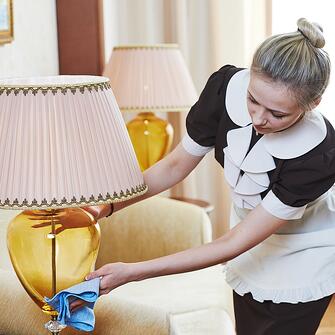
Hotel owners and housekeepers know that hotel rooms are often cleaner than guests' own homes. But that doesn't help allay the fears of guests who have seen one too many TV exposés on dirty hotel rooms.
In response, hotels are adopting extreme measures to calm guests' fears. In 2012, Best Western International rolled out a new cleaning program in which housekeepers use black lights to find invisible biological matter and UV-light wands to disinfect things like remotes. The new policy works, Best Western says: guest satisfaction for room cleanliness rose 12 percent. What else can a hotel do to reassure guests its rooms are clean?
Choosing the right in-room productsAfter Marriott's designers and brand managers approve a particular product, Lauren Webb, senior manager for product development, asks the practical questions: "Is it easy to clean? And will it show marks? And will the guest believe it's clean every time?" Webb, a former housekeeping manager, knows what to look for in room products, whether a hair dryer or an ironing board. They need to be made of durable materials that can withstand cleaning chemicals and are easy to wipe clean. A wastebasket with a decorative texture may look attractive, but "housekeepers aren't going to sit there with a toothpick to get the grime out of every crevice," she says.
Focusing on the remote control
The remote control inspires dread in many germophobes. That's why in 2012, Best Western introduced the "fresh remote" program. Remotes are sanitized by housekeepers, then placed in a hygienic envelope to reassure guests the remote is clean.
Reducing allergens
A high-quality allergen reducer like the True Air from Hamilton Beach is an effective and visible reminder to guests that a hotel cares about cleanliness. Look for an allergen reducer that can effectively filter the air of dust, dust mite debris, mold spores, pollen, smoke and pet dander while producing minimal noise.
Considering the coffee maker
An in-room coffee maker that can make regular, decaf, tea and hot water is a must-have for most guests. "In hotel rooms, people want a good cup of coffee, but they don’t want to make a cup of coffee using something a previous guest has used," says Suzanne Super, hospitality product manager for Hamilton Beach Commercial. To allay guests’ concerns about cleanliness, the company developed a single-cup coffee maker with a recyclable pod holder, individually wrapped in plastic, to replace the traditional brew basket.
Going disposable
Water glasses and coffee mugs are common focal points for cleanliness-obsessed guests, based on media exposés showing hotels where glasses aren't thoroughly washed. Concerns can be prevented with disposable cups and tableware.
Saving housekeepers' time
In the end, a room's cleanliness depends on how much time a housekeeper can spend on it. "Housekeeping is really all about time and efficiencies," Webb says. Small things, like having to wrap a cord around an iron, waste precious minutes. Irons with retractable cords are easier for both guests and housekeepers to use.
Remaking the bed takes up the most time of any housekeeping task, Webb says: "The bed is the focal point, and it has the most steps to strip it and then remake it and do the nice presentation." The goal should be to make the bed attractive but simple, she says.
Communicating with guests
In 2012, Hampton Inn began leaving yellow sticky notes on beds saying, "Duvet covers & sheets are clean for your arrival." The practice of laundering the duvets isn't new, reports USA Today, but the reminder to guests is.
Hyatt's research showed that women travelers especially "want assurance that their guest rooms have been cleaned, and want the opportunity to voice their needs to hotel personnel." Hyatt began adding "communication cards" to rooms with personal messages from housekeepers assuring guests that the room has been thoroughly cleaned, including the remote control and telephone, and inviting guests to share any feedback.
If you have a fun or interesting story idea, please submit it here. The best stories will be published on our blog and distributed to the HBC Community, nationally and potentially internationally. Further, we will reference your name and establishment for bringing it to our attention. A little publicity can always help to grow your business and awareness.


